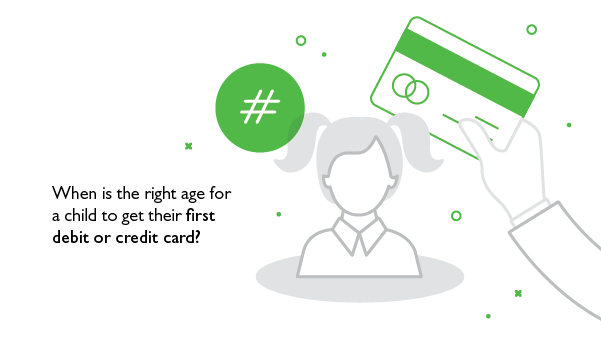It’s back-to-school season, albeit a bit different this time around. As you and your kids start preparing, it may be worth putting “first debit card or credit card” on your list next to backpack, pencils, paper and other regular items.
When is the right age for a child to get their first debit or credit card? There’s no right answer, but kids do have to grow up eventually. The more financial literacy they can build at an early age, the more ready for adult life they will be.
If you think this year might be the year for your child to get his or her first plastic. Here are some ways to know when it’s right, as well as some tips for how to educate them on responsible financial decision-making.

When is the best age for your child to get their first debit or credit card?
Every family’s situation is going to be unique, but there are some defining milestones that can help you judge if it’s appropriate for your child’s first debit or credit card:
- Open their first bank account: Opening an account is a big event in a child’s financial life, even if they’re using allowance money. If it’s a checking account, getting a debit card for them could be a good idea. The entire process can be a learning experience.
- Enter high school: High school is among the first steps to adulthood. You could use a debit card to help your child feel like an adult, but also teach them about responsibility.
- Get their first job: If your teenager starts earning a part-time income, think about helping them set up an account and debit card if you haven’t already. Such tools will be critical to help them learn money management and budgeting skills.
- Attend college or university: At this time, you kid may be mature enough to handle a credit card. Establishing a credit history at this age can be beneficial for their credit score down the road. However, it is vitally important they understand concepts like credit limits, credit utilization, interest and minimum payments.
Tips for safe use of a debit or credit card
Getting a first debit card or credit card can be beneficial for your child, but only if used safely. Here’s some guidance for how to impress this theme upon them:
- Talk to them about ATM and overdraft fees so they know the money they stand to lose if they are inattentive or careless.
- Go through a bank statement together so they know what information is contained in a statement and what it means.
- Download a banking app to their phone so they can actively and easily keep track of their accounts, spending, balances, transactions, payments and other information.
- Set limits and restrictions together so you’re both clear on what responsible use looks like. This includes things like daily withdrawal or purchase limits.
- Calculate interest on a credit card so they understand the importance of paying off balances and how interest can accrue quickly.
- Discuss security and fraud so they are aware of the risks. Have a discussion about creating PINs, strong app passwords, two-factor authentication and how to lock a card or report suspicious activity.
- Weigh getting a debit card versus a prepaid card so you are both on the same page regarding expectations and freedom of use.
Above all, try to use this experience as an interactive lesson in personal financial management. It’s important to instill these concepts at a young age.
If you’re considering getting a debit or credit card for your child, reach out to Bank Midwest. We have a variety of options available and can assist in teaching your kid about financial responsibility.
